April 8, 2025 | 22:46 GMT +7
April 8, 2025 | 22:46 GMT +7
Hotline: 0913.378.918
April 8, 2025 | 22:46 GMT +7
Hotline: 0913.378.918
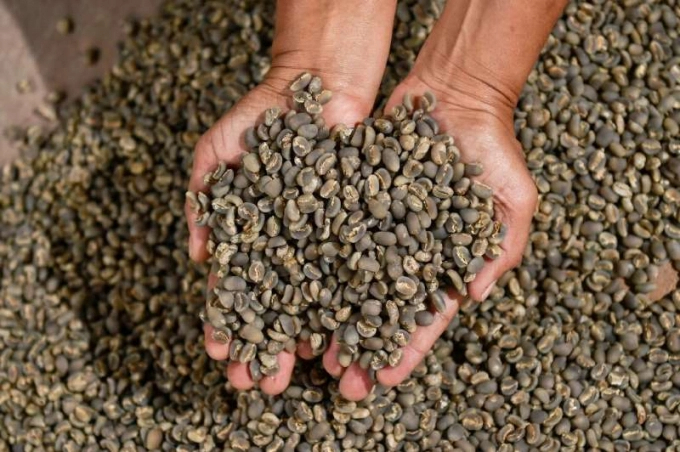
Update on the latest coffee market prices on 07/13/2023.
Coffee price on July 13 in the world market continues to decrease in both major exchanges.
At the time of the survey, the price of Robusta coffee on the London exchange for delivery in September 2023 decreased by $36/ton (equivalent to 1.4%); down to $2,534/ton.
And the price of coffee delivered in November 2023 on this exchange decreased by $22/ton (equivalent to 0.91%), at $2,400/ton.
The price of Arabica coffee on the New York exchange for September delivery in September 2023 decreased slightly by 0.55 cents/lb (equivalent to 0.35%); to 157.00 cents/lb.
For the November delivery term, the price of coffee on this exchange is also decreasing by 0.55 cents/lb (equivalent to 0.35%); at 156.45 cents/lb.
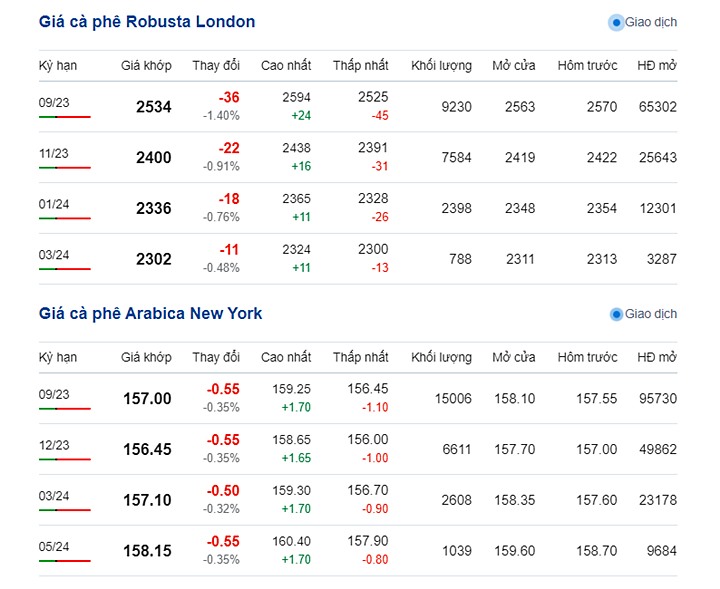
Latest online coffee prices on New York and London exchange
World coffee prices today had another 3rd consecutive decline, in the context of increasing sales pressure from Brazil. Even if the inventory report is decreasing, and the USD is weakening, it will only partially block the decline in coffee prices this week.
However, there are still positive supporting factors that keep coffee prices from falling further. That is the USD rate and inventory on the exchange.
Specifically, the USD continued to fall to the lowest level in more than a year, after the release of US Consumer Price Index data. This support the fact that the Fed will only raise interest rates again this year.
Meanwhile, the Robusta coffee inventory report on the London exchange on July 11 decreased by 2,500 tons (down 4.40% compared to the previous day), registered at 54,360 tonnes (or 906,000 bags), the lowest inventory level since 2016.
After the information, the dry and favourable weather supported the Brazilians to boost the harvest of Conilon Robusta in the new crop. Currently, Robusta coffee is entering the final stage and Arabica coffee is in the peak harvest.
Thus, the price of coffee on 07/13/2023 in the world market continues to decrease compared to yesterday.
Coffee price on July 13 in the domestic market decreased by VND 600/kg compared to yesterday.
Specifically, the price of Lam Dong coffee (in 3 districts of Di Linh, Bao Loc and Lam Ha) is being purchased at VND 64,700/kg today.
In Cu M'gar district (Dak Lak), the price of coffee today is kept at VND 65,300/kg. In Ea H'leo and Buon Ho districts, today's coffee price in Dak Lak is at VND 65,200/kg.
Coffee prices in Gia Nghia and Dak R'lap of Dak Nong province today were purchased at VND 65,400 and VND 65,300/kg, respectively.
In Gia Lai, the price of coffee in Chu Prong today is at VND 65,100/kg; while at Pleiku and La Grai are keeping the same level of VND 65,000/kg.
The price of coffee today in Kon Tum is being purchased at VND 65,100/kg.
Coffee prices in the country continue to fall today. This is the third day in a row that the domestic coffee market has dropped and returned to the price threshold of VND 65,000/kg.
Thus, the price of coffee on 07/13/2023 in the domestic market traded around the threshold of VND 64,700 - 65,400/kg.
$1 = VND 23,460.00 - Source: Vietcombank
Translated by Hoang Duy
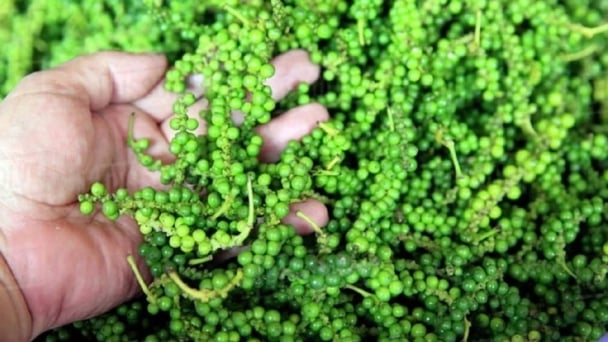
(VAN) Pepper prices on April 8, 2025, indicate stability in global and domestic markets. The average purchasing price in key regions stands at VND 154,200/kg.
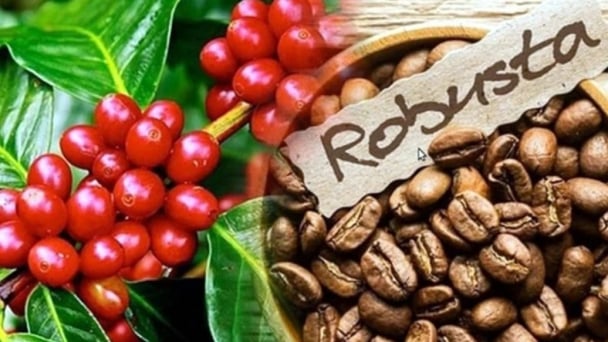
(VAN) Coffee prices on April 8, 2025, are experiencing significant fluctuations, with Robusta and Arabica prices dropping sharply on international exchanges.
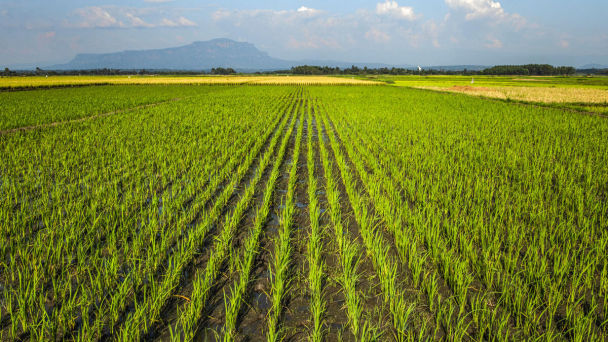
(VAN) Rising vegetable oil quotations offset lower prices for wheat, maize, rice and sugar.

(VAN) Coffee prices on April 4, 2025, are complex, influenced by both domestic and international market factors. Domestic coffee prices have slightly increased.

(VAN) Pepper prices on April 4, 2025, remain stable amid volatility. Many farmers are holding back their stock, leading to a quiet domestic pepper market.
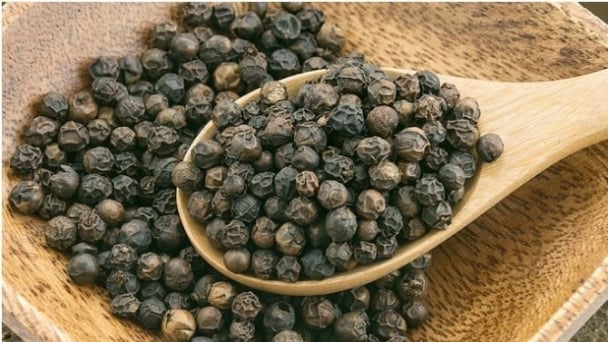
(VAN) Pepper prices on April 3, 2025, show stability domestically, global pepper prices declined slightly. Pepper prices range at VND 157,000 to VND 158,000/kg.
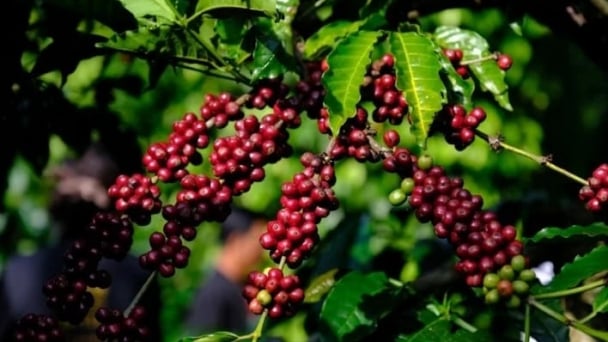
(VAN) Coffee prices on April 3, 2025, showed fluctuations between exchanges. Global coffee prices declined slightly while domestic coffee prices increased.